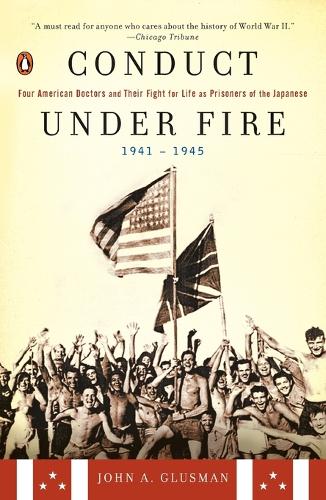
Conduct Under Fire: Four American Doctors and Their Fight for Life as Prisoners of the Japanese, 1941-1945
(Paperback)
Publishing Details
Conduct Under Fire: Four American Doctors and Their Fight for Life as Prisoners of the Japanese, 1941-1945
By (Author) John A. Glusman
Penguin Putnam Inc
Penguin USA
25th April 2006
United States
Classifications
General
Non Fiction
B
Physical Properties
Paperback
624
Width 140mm, Height 213mm, Spine 36mm
573g
Description
The fierce, bloody battles of Bataan and Corregidor in the Philippines are legendary in the annals of World War II. Those who survived faced the horrors of life as prisoners of the Japanese.In Conduct Under Fire, John A. Glusman chronicles these events through the eyes of his father, Murray, and three fellow navy doctors captured on Corregidor in May 1942. Here are the dramatic stories of the fall of Bataan, the siege of "the Rock," and the daily struggles to tend the sick, wounded, and dying during some of the heaviest bombardments of World War II. Here also is the desperate war doctors and corpsmen waged against disease and starvation amid an enemy that viewed surrender as a disgrace. To survive, the POWs functioned as a family. But the ties that bind couldn't protect them from a ruthless counteroffensive waged by American submarines or from the B-29 raids that burned Japan's major cities to the ground. Based on extensive interviews with American, British, Australian, and Japanese veterans, as well as diaries, letters, and war crimes testimony, this is a harrowing account of a brutal clash of cultures, of a race war that escalated into total war. Like Flags of Our Fathers and Ghost Soldiers, Conduct Under Fire is a story of bravery on the battlefield and ingenuity behind barbed wire, one that reveals the long shadow the war cast on the lives of those who fought it.
Reviews
Page-turning.Wall Street Journal
"A thoughtful, humane meditation on war and family history, full of myth-burstingtruths."Kirkus Reviews
"Glusman has written a compelling account of courage and sacrifice from the perspective of the doctors who sought to keep their fellow captives alive under conditions that amounted to a mass sentence of death. Over a third of American POWs held by the Japanese died in captivity. With grace and clarity, Glusman gives a keen sense of loss to that statistic, and a heroic dignity to those who surviveda major achievement indeed."Publishers Weekly (Starred Review)
"Original, moving, and astonishing."Kenzaburo Oe, Winner of the Nobel Prize in Literature
"Epic... A marvelously humane and beautifully rendered tribute."San Francisco Chronicle
Author Bio
John A. Glusman is editor in chief of Farrar, Straus & Giroux. He has been a contributing editor to the Paris Review and has written for numerous publications, including The Economist, The Washington Post Book World, The Christian Science Monitor, and Rolling Stone.
